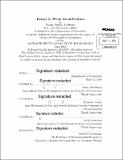Essays in weak identification
Author(s)
Andrews, Isaiah Smith
DownloadFull printable version (11.42Mb)
Other Contributors
Massachusetts Institute of Technology. Department of Economics.
Advisor
Anna Mikusheva, Whitney Newey, and Jerry Hausman.
Terms of use
Metadata
Show full item recordAbstract
Economic researchers and policymakers need reliable tools both to estimate economic relationships and to measure the uncertainty surrounding their estimates. Unfortunately, economic data sometimes contains limited information useful for estimating relationships of interest. In such cases, the statistical techniques commonly used in applied economics can break down and fail to accurately reflect the level of uncertainty present in the data. If they rely on such tools, researchers and policymakers may come away with serious misconceptions about the precision and reliability of their estimates. Econometricians refer to models where the lack of information in the data causes common statistical techniques to break down as weakly identified. In this thesis, I examine several questions relating to weak identification. In the first chapter, I introduce the class of conditional linear combination tests. These tests control size under weak identification and have a number of optimality properties in a conditional problem. I suggest using minimax regret conditional linear combination tests and propose a computationally tractable class of tests that plug in an estimator for a nuisance parameter. In the second chapter, I consider the problem of detecting weak identification. When weak identification is a concern researchers frequently calculate confidence sets in two steps, first assessing the strength of identification and then deciding whether to use an identification-robust confidence set. Two-step procedures of this sort may generate highly misleading confidence sets, and I demonstrate that two-step confidence sets based on the first stage F-statistic can have extremely poor coverage in linear instrumental variables models with heteroskedastic errors. I introduce a simple approach to detecting weak identification and constructing two-step confidence sets which controls coverage distortions. In the third chapter, joint with Anna Mikusheva, we consider minimum distance statistics and show that in a broad class of models the problem of testing under weak identification is closely related to the problem of testing a "curved null" in a finite-sample Gaussian model. Using the curvature of the model, we develop new finite-sample bounds on the distribution of minimum-distance statistics, which we show can be used to detect weak identification and to construct tests robust to weak identification.
Description
Thesis: Ph. D., Massachusetts Institute of Technology, Department of Economics, 2014. Cataloged from PDF version of thesis. Includes bibliographical references (pages 219-228).
Date issued
2014Department
Massachusetts Institute of Technology. Department of EconomicsPublisher
Massachusetts Institute of Technology
Keywords
Economics.